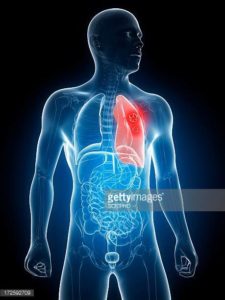“The use of targeted therapies, particularly those against the key mediator of angiogenesis, has the potential to improve outcomes for nonsmall cell lung cancer (NSCLC) patients.”
When the articles linked and posted below talk about “anti-angiogenic” therapies for lung cancer they are talking about toxic chemotherapy regimens. And I would generally agree that lung cancer patients need to treat their lung cancer, depending on the stage at diagnosis, aggressively.
Unfortunately, toxicity means short, long-term and late stage side effects.

What about non-toxic anti-angiogenic therapies. Evidence-based anti-angiogenic nutrition, supplementation, etc. therapies that can enhance chemo such as Avastin ( bevacizumab) and kill lung cancer as well. Studies show that many non-toxic anti-angiogenic supplements can also reduce the risk of collateral damage to lung cancer patients undergoing toxic chemotherapy.
I am a cancer survivor of a different but equally, aggressive cancer called multiple myeloma. I have remained in complete remission from my “incurable” cancer since 1999 by following a metronomic, anti-angiogenic lifestyle through nutrition, supplementation, etc.
Have you been diagnosed with lung cancer? What stage? Scroll down the page, post a question or comment and I will reply to you ASAP.
thank you,
David Emerson
- Cancer Survivor
- Cancer Coach
- Director PeopleBeatingCancer
Recommended Reading:
“The long-term prognosis for patients with advanced non-small cell lung cancer (NSCLC) remains poor despite the availability of several cytotoxic chemotherapy regimens.
Bevacizumab, a recombinant humanized monoclonal anti-VEGF antibody, is the most clinically advanced antiangiogenic agent in NSCLC. In a phase III study, bevacizumab showed significantly improved overall and progression-free survival when used in combination with standard first-line chemotherapy in patients with advanced NSCLC…”
“PURPOSE OF REVIEW: The use of targeted therapies, particularly those against the key mediator of angiogenesis, vascular endothelial growth factor, has the potential to improve outcomes for nonsmall cell lung cancer (NSCLC) patients. This review summarizes recent findings on targeting mediators of angiogenesis, treatment options and molecular targets in development.
RECENT FINDINGS: Bevacizumab, a recombinant humanized monoclonal antivascular endothelial growth factor antibody, in a phase III study, showed significantly improved overall and progression-free survival when used in combination with standard first-line chemotherapy in patients with advanced NSCLC and was generally well tolerated.
Several small-molecule vascular endothelial growth factor receptor tyrosine kinase inhibitors have also shown promise in phase I and II trials in NSCLC. This review summarizes the most important findings on angiogenesis inhibitors in NSCLC and discusses the potential for the use of these novel agents in different settings.”




